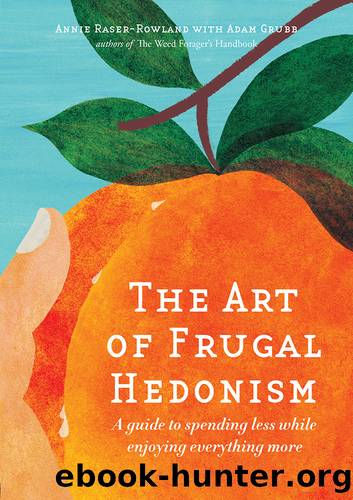The Art of Frugal Hedonism by Annie Raser-Rowland & Adam Grubb

Author:Annie Raser-Rowland & Adam Grubb [Raser-Rowland, Annie & Grubb, Adam]
Language: eng
Format: epub
Tags: Ethics of Consumption, Home economics—Accounting, Quality of life
ISBN: 9780994392831
Publisher: Permaculture Principles P/L
Published: 2016-10-20T13:00:00+00:00
26. Reinvent Christmas
Your authors realise it only happens once a year, but we reckon that reinventing Christmas is useful because it is so emblematic: if Christmas can be improved via frugality, then anything can.
Itâs been over ten years since Annie told everyone she knew that she didnât want any Christmas presents and wouldnât be giving any. She made an exception for her one remaining grandma, said granny being old enough to maybe not quite get it (and also old enough to have done a lot of frugal-time herself, enabling her to really appreciate small gifts like a box of Turkish delight). Those merry souls who choose to vanquish Christmas consumption mania often make a similar exception for children, but keep the presents humble in scale. Perhaps a stocking filled with small treasures: packets of glitter, a book, novel trinkets (curly straws, a magnifying glass, chocolate coins), or craft materials â perfect for allowing the grown-ups to relax all day while the stockingâs contents are explored and put to use.
Find the consumption grotesque, but would still like to give something? What about only giving non-material presents (like a voucher for a massage, a lesson of some kind, or an afternoon of professional housecleaning). We know one circle of friends who decided to each make a donation to a charity at Christmas instead of giving each other presents. If you want to keep it small and yet stay away from useless tokenistic stuff, why not put aside a selection of the yearâs best homemade preserves and pickles to serve as gifts? People love pickles! Such treats also have the advantage of a long shelf life, meaning they create no sense of obligation to eat even more food over Christmas.
For many people, festive food is another area of consumption-induced strain, and The Perfect Christmas Meal becomes an exhausting marathon of shopping and preparation, leaving (usually) the woman of the house so busy getting a parade of dishes to the table that she barely gets to sit down and enjoy them. And this over-catering scarcely makes sense in an age and culture where most people feel like they eat too much on a regular basis.
In eras when daily fare was very humble and featured virtually no âtreatâ foods, a feast was anticipated with legitimate glee, typically including more animal protein, and energy-dense luxuries like dried fruit and honey. But we live in an age where meat is left to spoil in thousands of refrigerators across the country daily, hamburgers and milkshakes are thrown away half consumed, and dried fruit is considered a virtuous alternative to snacking on cookies. This excess-on-top-of-excess can lead to yet more Christmassy stress, as attempts to resist over-indulging at a parade of festive season work bashes and family gatherings segue seamlessly into guilt and dismayed resolutions to get to the gym more often to work off the âholiday bulgeâ.
Whatâs the alternative? If youâre feeding people, you could focus on quality instead of quantity to avoid ending up with piles of excess food.
Download
This site does not store any files on its server. We only index and link to content provided by other sites. Please contact the content providers to delete copyright contents if any and email us, we'll remove relevant links or contents immediately.
Individual by Jessica Bellef(835)
The Knights Hospitaller by Nicholson Helen(722)
Kitchen & Bathroom Planning Guidelines with Access Standards by NKBA(650)
The Great Indoors by Emily Anthes(647)
Differential Equations by Krantz Steven;(616)
Three Birds Renovations by Erin Cayless(602)
25 Tropical Houses in the Philippines by Elizabeth Reyes(587)
The Great Indoors: The Surprising Science of How Buildings Shape Our Behavior, Health, and Happiness by Emily Anthes(585)
Analysing Architecture by Unwin Simon(548)
Japan Living by Marcia Iwatate & Geeta K. Mehta(538)
Vitruvius by Morris Hicky Morgan(521)
The Art of Frugal Hedonism by Annie Raser-Rowland & Adam Grubb(516)
The Art of Japanese Architecture by Young David & Michiko Young(515)
Green Interior Design by Lori Dennis(508)
Farmhouse Revival by Susan Daley(457)
The Inspired Room by Melissa Michaels(416)
Precedents in Architecture by Clark Roger H. Pause Michael & Michael Pause(404)
Remodelista by Julie Carlson(401)
The Modern Chair: Classic Designs by Thonet, Breuer, Le Corbusier, Eames and Others by Clement Meadmore(384)
